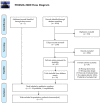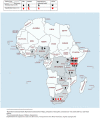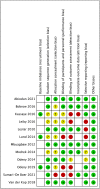Two-way text message interventions and healthcare outcomes in Africa: Systematic review of randomized trials with meta-analyses on appointment attendance and medicine adherence
- PMID: 35421134
- PMCID: PMC9009629
- DOI: 10.1371/journal.pone.0266717
Two-way text message interventions and healthcare outcomes in Africa: Systematic review of randomized trials with meta-analyses on appointment attendance and medicine adherence
Abstract
Background: The growing access to mobile phones in Africa has led to an increase in mobile health interventions, including an increasing number of two-way text message interventions. However, their effect on healthcare outcomes in an African context is uncertain. This systematic review aims to landscape randomized trials involving two-way text message interventions and estimate their effect on healthcare outcomes.
Methods: We searched Medline, Embase, Cochrane Central Register of Controlled Trials, The Global Health Library (up to 12 August 2021) and trial registries (up to 24 April 2020). Published and unpublished trials conducted in Africa comparing two-way text message interventions with standard care and/or one-way text message interventions were included. Trials that reported dichotomous effect estimates on healthcare appointment attendance and/or medicine adherence were assessed for risk of bias and included in meta-analyses. Results of other outcomes were reported descriptively.
Results: We included 31 trials (28,563 participants) all set in Sub-Saharan Africa with a wide range of clinical conditions. Overall, ten different trials were included in the primary meta-analyses, and two of these had data on both medicine adherence and appointment attendance. An additional two trials were included in sensitivity analyses. Of the 12 included trials, three were judged as overall low risk of bias and nine as overall high risk of bias trials. Two-way text messages did not improve appointment attendance, RR: 1.03; 95% CI: 0.95-1.12, I2 = 53% (5 trials, 4374 participants) but improved medicine adherence compared to standard care, RR: 1.14, 95% CI: 1.07-1.21, I2 = 8% (6 trials, 2783 participants).
Conclusion: Two-way text messages seemingly improve medicine adherence but has an uncertain effect on appointment attendance compared to standard care.
Systematic review registration: PROSPERO CRD42020175810.
Conflict of interest statement
The authors have declared that no competing interests exist.
Figures





References
-
- Bank World, World Development Report 2016: Digital Dividens. Washington DC: World Bank, 2016.
-
- World Health Organization. Global diffusion of eHealth: making universal health coverage achievable: report of the third global survey on eHealth. Geneva: World Health Organization, 2016.
-
- Silver L, Johnson C. Internet Connectivity Seen as Having Positive Impact on Life in Sub-Saharan Africa. Washingtong DC: Pew Research Center, 2018.
Publication types
MeSH terms
LinkOut - more resources
Full Text Sources
Miscellaneous

